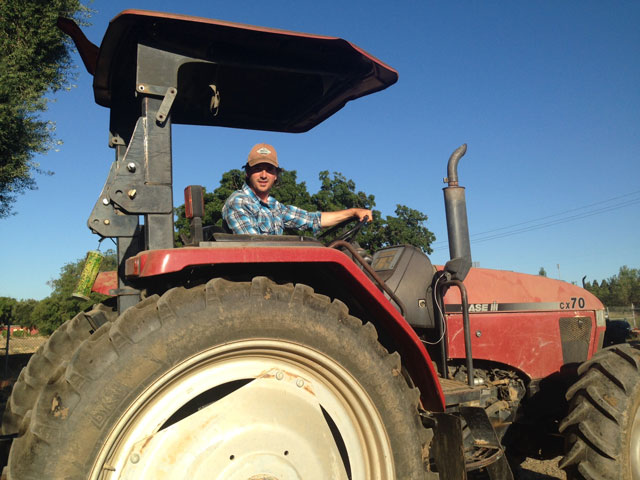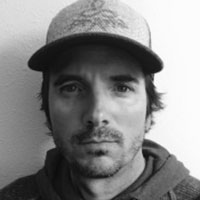
** Warning: Naughty language ahead.
Early in my farming career I almost gave up and quit.
There I was, high up on a big tractor pulling an offset disc through moist soil, when out of the corner of my eye, as I turn the tractor 180 degrees to make another pass, I see something moving on the land I just tilled.
I quickly stop the tractor and there, flopping in the loose soil, I see a baby jackrabbit. Discs are sharp, steel blades that are ganged up together and pulled through the land to slice and turn over weeds and soil. When I looked at the baby rabbit I noticed it was trying to hop away, its big floppy ears frantically swinging back and forth, but one of its rear legs was severed almost completely off and its struggle was hopeless.
Shit.
One of my earliest memories is when I was four years old, riding in the back of my parents’ Ford Pinto. We stop and wait for a herd of cows to cross the road. I’m watching the cows take their sweet time and I am amazed at their sheer size and bulk. The farmer slaps one of the cows hard on the ass with a stick and says something like, “Go on! Git!” The cow lets out a groan and moves forward just a little faster. I stand up on the rear seat and lean out of my mother’s open window and yell, “Don’t hit that cow you jackass!” I think my fist was balled up and shoved high in the air at that farmer.
Of course my mother yelled at me and smiled at the farmer, probably embarrassed that somehow I learned the word jackass and used it correctly in context. Me? I was livid. I wanted to kick that farmer in his skinny ass. From a very early age, I had an affinity toward animals and a healthy distrust (even dislike maybe) for humans.
Animals’ innocence compared to our, well, jackassness, was apparent to me early on and has stuck with me ever since, so you can see how the incident with the injured bunny would affect someone like me. That was it. I wasn’t gonna do that no more.
I will refrain from telling you how the rabbit was put out of its misery but just know that I couldn’t do it, somebody else did. I trap spiders in my house and set them free outside. I try not to swat flies. I trust my dog more than I trust the Pope. I always root for the bull in rodeos or bullfighting. And I get a kick out of it every time a moose bulldozes the feckless tourist with a camera trying to get a selfie with his arm around the gangly creature.
To say that I like animals more than humans is pretty close to the truth. And I believe it’s justice that once we do ourselves in, the animals will once again inherit the earth that only they seem to know how to treat properly. Perhaps Lord Byron expresses my view best: “I love not man the less, but Nature more.”
One of the reasons I went into organic farming is because I believe it does the least amount of harm in the effort of growing food for others. Less harm to the soil than chemical farming, less harm to the water, the air, and most importantly to the insects and animals that live in and on the land we cultivate.
Having studied Buddhism, Taoism, and Eastern thought for two decades I took the Buddha’s precept of “Do no harm” to heart. I wanted to live my life adhering to that principle as much as I could.
Before I was a farmer I used to think that I was causing the least harm by being a vegetarian and not eating meat. But then I read how Tibetan Buddhists used to feel sorry for the vegetarians in lowland India because of all the insects that were killed in growing vegetables. “One yak can feed a village for weeks. So one life is taken instead of millions.” That was an interesting perspective. And I have to admit, as a farmer I kill lots and lots of insects, even though I’m not trying to. Just cultivating the soil alone causes much death and destruction.
I think about it all the time. When I’m up on that tractor tilling the land, I can see the carpenter bees losing the flowering weeds I’m tilling in. I can watch lizards scurry away just before my tractor tires run over them. Honey bees, beneficial wasps, butterflies, and countless other creatures down there in the wake of my destruction—they’re all on my mind as I slice and turn the soil over prepping the land for growing organic fruits and vegetables.
One of the aims of organic farming is to do less harm. We try to encourage beneficial insects instead of spraying chemicals. We try to plant crops in ways that reduce disease pressure instead of spraying chemicals. We even try to encourage certain predators like redtail hawks to keep in check the “pests” that harm our crops. But it does not mean we do no harm.
I don’t even know if it’s possible to do no harm. Maybe it was mistake in translation and the Buddha really said, “Try to do the least amount of harm as you possibly can.” Even the naked ascetics in India who sweep the ground in front of them while they walk in order to avoid killing an insect cannot live up to a “do no harm” ethos. The moment they open their mouths and take a bite of food they have taken part of the killing of life in order to eat, even if it is strictly vegan. This cannot be avoided in this world.
There is an old Zen saying that goes something like, “We eat other things and then we are eaten.” That pretty much sums it up I guess. Everyone gets theirs. Even the insects get their turn once we die and return to the earth. A just revenge? I think so.
Now, when I’m up on that tractor and I think of the death and destruction I leave in my wake, I feel the pain of organic farming but I tell myself that at least it’s not as bad as it could be. And if we want to eat, well this is the reality of it and at least I’m witnessing it. Kind of like how most of us want to eat “happy” meat or “humanely raised” meat and feel good about ourselves but none of us want to go to the slaughterhouse and kill the animals ourselves. We like it nicely packaged and ready for the grill. There’s not much reality in that.
And so what I’ve learned in all this is is basically what the Buddha said over 2,000 years ago: reality is a bitch. Well, he said something a little different than that but the overarching premise that “there is suffering” is felt most by me when I’m farming.
I witness daily the countless lives taken in order to feed others. I see the cycle of birth, old age, and death played out over and again and I see how this cycle is a self-supporting cycle. Things must die so we can eat. Then we die so things can eat. The interdependent relationship between everything that lives on this planet is complex and mystifying. This realization does not make it any easier for me to watch all of these creatures die at my hands but it does always cause me to question, “How else are we supposed to do this?”
I still feel pain as I cultivate the soil knowing how much death is occurring, how many creatures I’m killing in an effort to deal with weeds or prep the soil. And I’m always asking myself, “How many weeds can we live with? Do we have to take all of them down? Maybe we can leave some for the bees.” When I see a blue-bellied lizard trying to scurrying away from the 15,000 pounds of tractor under me about to squish it I slow down and yell out, “Go lizard go!” But I know not all of them make it. And this knowledge always makes me question what I’m doing. I don’t want to cause this pain, this destruction.
I went into organic farming to create life, nurture life, and to build good soil to leave behind for future generations. But the destruction side of farming is there as well. How can it not be?
I didn’t quit farming that day with the baby rabbit but I sure came close. And I don’t know how much longer I’ll be doing it.
But even if I stop it doesn’t mean I’ve removed myself from causing harm in this world. It will just mean someone else is doing it for me, I just won’t have to witness it. I think I prefer knowing what goes into bringing me food—the reality of it makes for a better perspective. I still try not to eat much meat because I know how animals are slaughtered. I know how much water it takes to produce one pound of beef. And despite a view that, “One animal feeds many while farming vegetables kills millions of insects,” I also know how many insects that animal has killed and how many were killed in feeding it and producing the feed to feed it.
There’s no way out of this. For me the pain of farming must be felt.
And in feeling the pain of all of that death and destruction comes the unvarnished truth of our existence in this world. No matter how innocent we may believe ourselves to be in our eating habits we are all part of the system and we are all in the loop. No one escapes. No one gets to claim a “zero karma” rating from the Do No Harm Institute.
I know there are others out there like me working to farm with the least amount of harm possible. Imagine a world where all farmers had that perspective. Or at least most farmers. Heck, why not most people? We need more people to root for the bull, to cheer on the scurrying lizard, to catch and release the innocent spider. I know I can’t be alone in this view. I know that the carpenter bees are on my side, and so are the jackrabbits, the crickets, and the redtail hawks.
I have whole legions behind me and their numbers greatly outweigh ours. You know who I’m rooting for.
~
Author: J. Jason Graff
Image: Author’s own; Nicole Harrington/Unsplash
Editor: Katarina Tavčar






Read 0 comments and reply